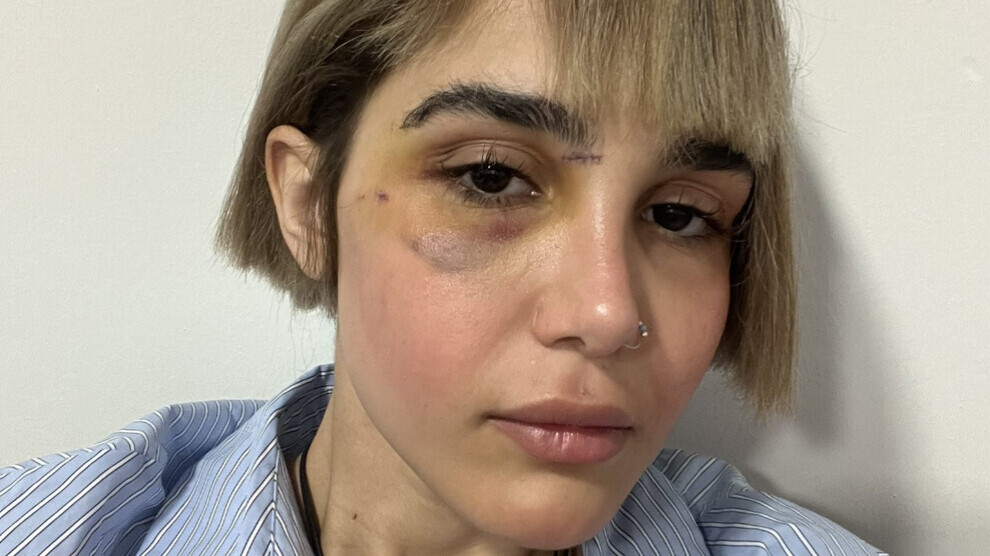Kurdish journalist Maroofian arrested and tortured in Sulaymaniyah
Kurdish journalist Nazila Maroofian left Iran due to heavy political persecution and said she was arrested and tortured in the southern Kurdish city of Sulaymaniyah.
Kurdish journalist Nazila Maroofian left Iran due to heavy political persecution and said she was arrested and tortured in the southern Kurdish city of Sulaymaniyah.

Kurdish journalist Nazila Maroofian was arrested four times after an interview with the father of Jina Mahsa Amini, the young Kurdish girl killed while in police custody in Tehran in September last year.
The journalist had to leave Iran due to persecution and fled to the Kurdistan region of Iraq. As Maroofian said in her account on the X platform, she was arrested in Sulaymaniyah and held for 13 days. She was tortured in custody.
In a video she published, she said that until recently she had not thought about leaving Iran. However, she is now no longer able to work in her own country and is constantly persecuted. After her last release, she was summoned again by the secret service, while her mother was warned that her daughter had many enemies and could suddenly die in various ways.
"I have always believed that we must stay in Iran and resist. I still believe that," said the 24-year-old. She wanted to report on what was done to her and other journalists last year. She was beaten and exposed to sexual violence: "That’s why I couldn’t stay in Iran."
Nazila Maroofian said: "There are many women like me in the Iranian regime’s detention centers. I hope to give them a voice. I want to continue my journalistic work from here. When I said goodbye to my family and left Iran, I thought it would be the worst day of my life. But then I realized that things could get even worse. Because of my experiences, I have memory problems and sometimes even forget the names of those I love."
Background
The 23-year-old Kurdish journalist Nazila Maroofian has been arrested. She was first targeted by the regime authorities last October because of an interview with Amjad Amini, the father of Jina Mahsa Amini, whose violent death in police custody on 16 September 2022 ignited the popular uprising in Iran and East Kurdistan. Amini accused the authorities of lying about his daughter's death. According to official information, “health” problems led to the death of 22-year-old Jina Amini. Her family, however, said that she was killed by police officers who hit her in the head. This was also indicated by statements from the Tehran hospital to which Amini was admitted on 13 September 2022. By then she was already brain dead.
Maroofian was sentenced to two years in prison in January for "propaganda against the state" in connection with her reporting on the death of Jina Mahsa Amini. She had recently left prison on bail. She was imprisoned again in July because, among other things, she had written about cases of sexual assaults on female prisoners in Iran. In mid-August she ended up behind bars again, this time in Waramin, just 24 hours after her release. Maroofian, who, like Jina Mahsa Amini, comes from Seqiz in East Kurdistan and works for the media platform Rouydad 24, is also studying at Tehran's Allameh Tabatabai University.
After her recent release, she published several photos on social networks that showed her without the obligatory headscarf. According to the KHNR, Maroofian received repeated threatening calls from officials in the Iranian Ministry of Intelligence, who asked her to stop her activities on social networks.
Maroofian's most recent detention was justified by the Iranian authorities with a post on X (formerly Twitter) in which the journalist expressed solidarity with the Iranian singer Mehdi Yarrahi. The musician was recently arrested by the regime for publishing a song in which he questioned the obligation to wear a headscarf. The "illegal song," as the mullahs’ judiciary labelled the song, called 'Roosarito' (Your Headscarf), refers to the ‘Jin, Jiyan, Azadî’ revolution led by women. Yarrahi sings, among other things: "Take off your headscarf, let your hair free (...)."
The piece is "dedicated to the noble women of my homeland who are courageously at the forefront of the ‘Women, Life, Freedom’ movement."